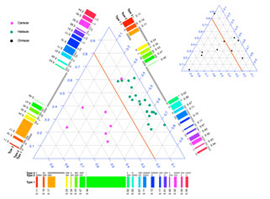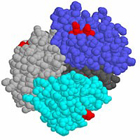Selected Publications
Bay RA, Bielawski JP. (2013). Inference of Functional Divergence Among Proteins When the Evolutionary Process is Non-stationary. J Mol Evol. 2013 Apr;76(4):205-15. doi: 10.1007/s00239-013-9549-0. Epub 2013 Feb 27. PubMed PMID: 23443835.
Bielawski JP. (2013). Detecting the signatures of adaptive evolution in protein-coding genes. Curr Protoc Mol Biol. 2013 Jan; Chapter 19:Unit 19.1.. doi: 10.1002/0471142727.mb1901s101. PubMed PMID: 23288462.
Dunn KA, Jiang W, Field C, Bielawski JP. (2013). Improving evolutionary models for mitochondrial protein data with site-class specific amino acid exchangeability matrices. PLoS One. 2013;8(1):e55816. doi: 10.1371/journal.pone.0055816. Epub 2013 Jan 31. PubMed PMID: 23383286; PubMed Central PMCID: PMC3561347.
Bay RA, Bielawski JP. (2012). Recombination detection under evolutionary scenarios relevant to functional divergence. J Mol Evol. 2011 Dec;73(5-6):273-86. doi: 10.1007/s00239-011-9473-0. Epub 2012 Jan 1. PubMed PMID: 22210457.
Garvin MR, Bielawski JP, Gharrett AJ. (2011). Positive Darwinian selection in the piston that powers proton pumps in complex I of the mitochondria of Pacific salmon. PLoS One. 2011;6(9):e24127. doi: 10.1371/journal.pone.0024127. Epub 2011 Sep 28. PubMed PMID: 21969854; PubMed Central PMCID: PMC3182164.
Dunn KA, Bielawski JP, Ward TJ, Urquhart C, Gu H. (2009). Reconciling ecological and genomic divergence among lineages of listeria under an “extended mosaic genome concept”. Mol Biol Evol. 2009 Nov;26(11):2605-15. doi: 10.1093/molbev/msp176. Epub 2009 Aug 10. PubMed PMID: 19666992.
Morine MJ, Gu H, Myers RA, Bielawski JP. (2009). Trade-offs between efficiency and robustness in bacterial metabolic networks are associated with niche breadth. J Mol Evol. 2009 May;68(5):506-15. doi: 10.1007/s00239-009-9226-5. Epub 2009 Apr 14. PubMed PMID: 19365645.
Ward TJ, Ducey TF, Usgaard T, Dunn KA, Bielawski JP. (2008). Multilocus genotyping assays for single nucleotide polymorphism-based subtyping of Listeria monocytogenes isolates. Appl Environ Microbiol. 2008 Dec;74(24):7629-42. doi: 10.1128/AEM.01127-08. Epub 2008 Oct 17. PubMed PMID: 18931295; PubMed Central PMCID: PMC2607178.
Sullivan MB, Coleman ML, Quinlivan V, Rosenkrantz JE, Defrancesco AS, Tan G, Fu R, Lee JA, Waterbury JB, Bielawski JP, Chisholm SW. (2008). Portal protein diversity and phage ecology. Environ Microbiol. 2008 Oct;10(10):2810-23. doi: 10.1111/j.1462-2920.2008.01702.x. Epub 2008 Jul 31. Erratum in: Environ Microbiol. 2011 Oct;13(10):2832. PubMed PMID: 18673386; PubMed Central PMCID: PMC2657995.
Bao L, Gu H, Dunn KA, Bielawski JP. (2008). Likelihood-based clustering (LiBaC) for codon models, a method for grouping sites according to similarities in the underlying process of evolution. Mol Biol Evol. 2008 Sep;25(9):1995-2007. doi: 10.1093/molbev/msn145. Epub 2008 Jun 26. PubMed PMID: 18586695.
Bao L, Gu H, Dunn KA, Bielawski JP. (2007). Methods for selecting fixed-effect models for heterogeneous codon evolution, with comments on their application to gene and genome data. BMC Evol Biol. 2007 Feb 8;7 Suppl 1:S5. PubMed PMID: 17288578; PubMed Central PMCID: PMC1796614.
Aguileta G, Bielawski JP, Yang Z. (2006). Proposed standard nomenclature for the alpha- and beta-globin gene families. Genes Genet Syst. 2006 Oct;81(5):367-71. PubMed PMID: 17159299.
Aguileta G, Bielawski JP, Yang Z.(2006). Evolutionary rate variation among vertebrate beta globin genes: implications for dating gene family duplication events. Gene. 2006 Sep 15;380(1):21-9. Epub 2006 May 4. PubMed PMID: 16843621.
Aris-Brosou S, Bielawski JP. (2006). Large-scale analyses of synonymous substitution rates can be sensitive to assumptions about the process of mutation. Gene. 2006 Aug 15;378:58-64. Epub 2006 May 22. PubMed PMID: 16797879.
Sullivan MB, Lindell D, Lee JA, Thompson LR, Bielawski JP, Chisholm SW. (2006). Prevalence and evolution of core photosystem II genes in marine cyanobacterial viruses and their hosts. PLoS Biol. 2006 Jul;4(8):e234. PubMed PMID: 16802857; PubMed Central PMCID: PMC1484495.
Links
- Bielawski Research Group:
|


 am an associate professor cross-appointed in the Departments of Biology (75%) and Mathematics & Statistics (25%) at ��ɫֱ�� (Halifax, NS). My PhD is in Genetics, from Texas A&M University, and I did my posdoctoral training at the University College London (UCL) under Dr. Ziheng Yang in the area of computational molecular evolution.
am an associate professor cross-appointed in the Departments of Biology (75%) and Mathematics & Statistics (25%) at ��ɫֱ�� (Halifax, NS). My PhD is in Genetics, from Texas A&M University, and I did my posdoctoral training at the University College London (UCL) under Dr. Ziheng Yang in the area of computational molecular evolution.
